Just Listed is a semi-annual feature of Pennsylvania’s cultural resources that were recently listed in the National Register of Historic Places.
Since our last Just Listed post, four properties from across the Commonwealth have been listed in the National Register of Historic Places. You can explore these National Register nominations and other historic properties in Pennsylvania via CRGIS, our online map and database.
The History of Pennsylvania Breweries
Pennsylvania may be the home to Yuengling, known as “America’s oldest brewery,” however the Commonwealth has yet to officially declare a craft beer month. However the ‘Official Tourism Website of the State of Pennsylvania’ dedicated a page to Pennsylvania Craft Brews, where Pennsylvania’s beer culture is significantly truncated…
The German immigrants who settled in Pennsylvania in the 1700s and 1800s brought many of their old-world traditions with them, including the love of great beer.
This particular blog post isn’t going to detail Pennsylvania’s brewing history (but maybe we’ll mull over the idea of a beer blog for a future post). And we’re a little late to honor American Craft Beer Week (which was mid-May this year). Regardless of any future beer narrations, resolutions or festivals, Pennsylvania indisputably has a rich brewing history and those buildings where brewing happened have been recognized by the National Register of Historic Places.
Duquesne Brewing Company, City of Pittsburgh, Allegheny County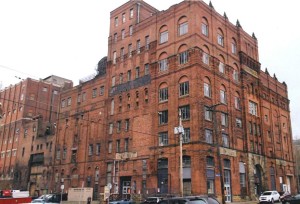
Listed May 11, 2015, for its Industrial significance at the local level.
The Duquesne Brewing Company of Pittsburgh was formed by a group of South Side businessmen and incorporated on April 4, 1899 and throughout its history pioneered advanced methods of brewing, marketing, and distribution until 1972 when the company ceased operations.
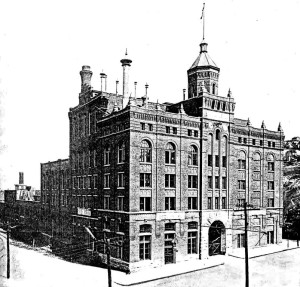 Duquesne Brewing Company benefited from consistent, progressive leadership, whose entrepreneurial approach to both the business and technology of brewing allowed the company to successfully adapt to many changes in the brewing industry. In 1900 – six years before the mass manufacture of automobiles – the company was also the first to introduce an electric beer delivery truck in Pittsburgh. As part of its bid to move quickly to the top of the restored beer market after Prohibition, the Duquesne Brewing Company became the first brewery in Pittsburgh to package its beer in cans, which then had cone-shaped tops and bottle-cap seals. At the height of its success, post-World-War II, Duquesne Brewing exported beer to twelve other states. Consequently, the Duquesne Brewing Company became one of the top ten breweries in the country following World War II. The buildings it constructed are conspicuous landmarks in the South Side neighborhood of Pittsburgh, recalling an era when each urban village was served by its own brewery, and communities prospered along with the successful businesses in their midst.
Duquesne Brewing Company benefited from consistent, progressive leadership, whose entrepreneurial approach to both the business and technology of brewing allowed the company to successfully adapt to many changes in the brewing industry. In 1900 – six years before the mass manufacture of automobiles – the company was also the first to introduce an electric beer delivery truck in Pittsburgh. As part of its bid to move quickly to the top of the restored beer market after Prohibition, the Duquesne Brewing Company became the first brewery in Pittsburgh to package its beer in cans, which then had cone-shaped tops and bottle-cap seals. At the height of its success, post-World-War II, Duquesne Brewing exported beer to twelve other states. Consequently, the Duquesne Brewing Company became one of the top ten breweries in the country following World War II. The buildings it constructed are conspicuous landmarks in the South Side neighborhood of Pittsburgh, recalling an era when each urban village was served by its own brewery, and communities prospered along with the successful businesses in their midst.
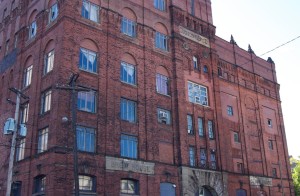 Following the war, Duquesne Brewing finally advanced a massive, expensive, modern expansion plan. In 1950, the company spent $3.5 million on a new, state-of-the-art, International Style brew house. The new building, constructed by Landau Brothers of Pittsburgh, was designed by Harley, Ellington, & Day, a prominent architectural firm from Detroit which specialized in brewery design. It contained four floors dedicated to grain storage, refrigerated hop storage facilities, a modern cooking room with inspection balconies, a master brewer’s office adjoined by a laboratory, a well-equipped medical center, a dining room for employees, and an auditorium-style meeting room, complete with tap room and projection booth, for shareholders and sales personnel.
Following the war, Duquesne Brewing finally advanced a massive, expensive, modern expansion plan. In 1950, the company spent $3.5 million on a new, state-of-the-art, International Style brew house. The new building, constructed by Landau Brothers of Pittsburgh, was designed by Harley, Ellington, & Day, a prominent architectural firm from Detroit which specialized in brewery design. It contained four floors dedicated to grain storage, refrigerated hop storage facilities, a modern cooking room with inspection balconies, a master brewer’s office adjoined by a laboratory, a well-equipped medical center, a dining room for employees, and an auditorium-style meeting room, complete with tap room and projection booth, for shareholders and sales personnel.
The Duquesne Brewing Company operated during a period of transition for the brewing industry from brewing on an independent, hand-operated, local scale to brewing on a fully-mechanized, mass-produced national scale. The contrasting styles of its two massive brick brewhouses, separated by half a century, reflect the changes in brewing, and in industry in general, during the first half of the 20th century. The heavy, ornate, Romanesque solidity of the 1899 structure exemplifies the tradition of the locally-based, German-dominated brewing industry in an era after modern advances in refrigeration, pasteurization, and bottling made a modern brewing factory possible, but before the true advent of mass production, marketing and distribution. The International Style cladding over Duquesne Brewing’s state-of-the-art, 1950 brew house conveys the boldly modern associations the brewery wished to project of its large-scale aspirations at the middle of the 20th century. Together, the buildings of the Duquesne Brewing Company plant stand for more than half a century of adaptation and innovation in brewing.
The building is currently being rehabilitated, utilizing the federal Rehabilitation Investment Tax Credit program, to convert this largely vacant industrial building into gallery and studio space in addition to apartments for artists.
Henry F. Ortlieb Company Bottling House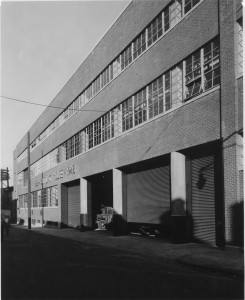
Listed August 5, 2014, for its Architectural significance at the local level.
The Henry F. Ortlieb Brewery was once one of the largest beer brewers in Philadelphia. Founded by the Ortlieb family in 1869, the brewery grew considerably in the early 20th century, adding to the plant as their market expanded. In 1948, the company’s final major building—the Bottling House—was completed to incorporate state-of-the-art bottling technology into the facility. While most of the impressive brewery complex has been erased by recent demolitions, the 1948 Bottling House has started a new life as a home for KieranTimberlake, a Philadelphia-based architecture firm recognized for its environmental ethos, research expertise, and pioneering design and planning. In order to relocate to this building, KieranTimberlake undertook an intensive rehabilitation project to adapt the vacant building for their needs while retaining as much of the original character and materials as possible. This project was also made possible in part by the federal Rehabilitation Investment Tax Credit program, administered by the Pennsylvania Historic Preservation Office.
The Bottling House features International Style influences, showcasing the distinctive design characteristics of post-World War II industrial buildings in the Philadelphia region, including horizontal massing; asymmetrical organization; ribbons of metal-frame windows; red brick with exposed concrete trim; and large-scale signage in a sans serif font.
The Philadelphia region adapted the International Style for industrial and institutional buildings a bit differently than in other geographic areas. Key to this regional distinction was the influence of Paul Cret, an architecture professor at the University of Pennsylvania, and a local tendency to retain continuity with the past. The result was the widespread use of brick as an exterior treatment—a material dominant across the city. Cret’s theories of modernism were a profound influence on his most famous student, Louis I. Kahn. The vast majority of International Style buildings in the Philadelphia region, both before and in the first decades after World War II, used the city’s traditional material palette: red brick with light-colored trim (usually concrete instead of earlier stone), with comparatively little use of the glass curtain walls otherwise typical of the International Style.
Ortlieb underwent considerable expansion in the 1930s. In 1933, the year of Prohibition’s repeal, the company began the construction of new ale-making facilities, with the Koelle firm again serving as architects. This was followed by other expansions until 1940, when Ortlieb announced a capacity expansion of 200,000 barrels, or a 200% increase over the brewery’s 1932 output. In addition to bottles, Ortlieb began packaging beer in a recent innovation: the six-pack can.
The up-to-date style carried Ortlieb through another three decades of production, outlasting the vast majority of their nineteenth- and early twentieth-century contemporaries and competitors in the region. The Ortlieb’s Bottling House thus represents an important, late chapter in Philadelphia brewing and industrial brewery facilities. The Ortlieb brewery remained a family-run business until it was sold to rival Christian Schmidt Brewing Company (then among the largest producers in the nation) in 1981.
-Excerpted from Pennsylvania Heritage Magazine, Summer 2015, A Place in Time, written by April E. Frantz.
All images for the National Register properties featured in this blog are on file in State Historic Preservation Office (SHPO). The SHPO would like to thank the authors of each nomination: Duquesne Brewing Company – Angelique Bamberg, Principal at Clio Consulting; Henry F. Ortlieb Bottling House – Emily T. Cooperman, ARCH Preservation Consulting.
Pennsylvania properties listed in the National Register of Historic Places since April 2015
ALLEGHENY COUNTY
Duquesne Brewing Company
City of Pittsburgh
LISTED 5/11/15
PHILADELPHIA COUNTY
Wyoming Central Office of the Bell Telephone Company
City of Philadelphia,
LISTED 5/11/15
MONTGOMERY COUNTY
Stewart Farmstead
Hatfield Township
LISTED 5/19/2015
NORTHAMPTON COUNTY
Gosztonyi Savings and Trust
City of Bethlehem
LISTED 5/19/2015

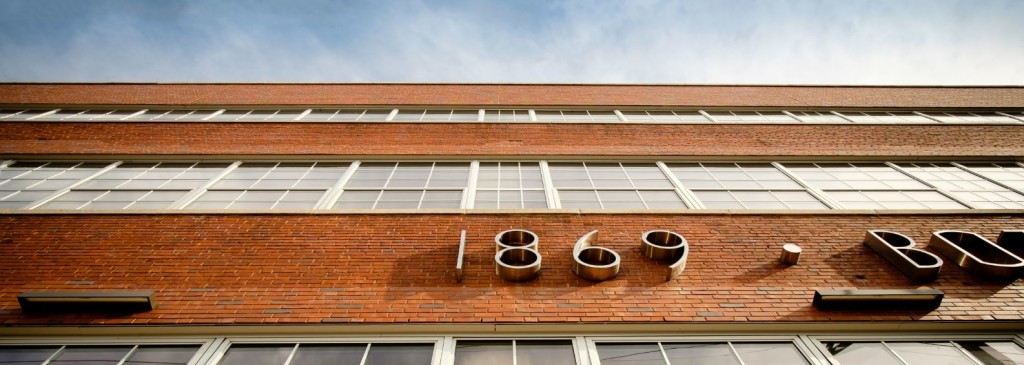
For lots more on Pennsylvania brewery history: audio, video files and text visit at http://pabreweryhistorians.tripod.com, Archives link has many articles.
Thank you Rich for providing the link to the Pennsylvania Brewery Historians website. The site has a wealth of resources related to Pennsylvania brewing. Thanks again!
My uncle is looking for information on the “Iron Mountain Brewery” (NOT Iron City), dating to the late 1800’s, with possible connections to a “Bechtold” family. I believe this would be in western/south western PA area. Any information would be appreciated.
Thank you,
Mike Connelly
Thanks for reaching out to us Mike. We’ll check our records and be back in touch with you with any information we learn.
Hello
I am trying to gather information on my grandfather, Jeffrey Cunniff. He was an irish immigrant and settled in the Fishtown section of Philadelphia. At the corner of Front and Thompson, he ran or leased a tap room for a local brewery and he, his wife and his 5 children lived above the taproom. He died in 1918-1919 – possibly in the Pandemic and my grandmother, Nellie J. Cunniff, took over until Prohibition shut her down. I remember my father telling me that when he got home from school, he went to help out in the taproom and that there were hard-boiled eggs on the bar. I want to find out if this family story is true,
How would I search this story?
Best regards,
Nancy Cunniff Cole
Philadelphia Business Directories, on microfilm at Free Library, some possibly available philageohistoriy.org. Not much information but might confirm the owner and location.
Do you have any history of a Malanowski Brewery in lighter Dallas, PA or Bedford, PA ?
Hi Peter,
Unfortunately, it doesn’t look like we do have information on this one in our system. If you have more specific information you’d like to share, please feel free to send us an email at mail@pahistoricpreservation.com and we can check again. Thanks for your comment!
I have just dug up a bottle intact possibly one of the first brewers in Phiada That is ho is spelled on this bottle, it is a blob top with a full lion laying down and it says G.F ROTHAHACKER & SONS PHILADA, on the back it says THIS BOTTLE NOT TO BE SOLD. I can’t find anything about this brewer exept they brewed from 1830 to 1840 . If you can find some info for me. Thanks Steve
Rothacker, Lion Brewery, Brewerytown.
American Breweries III Mid-Atlantic Edition (Van Wieren 2016)
PA 563a Christian Schnitzel (31st below Master) 1854 1864
563b Harry Rothacker 1864 1870
563c G. F. Rothacker 1870 1880
563d G. F. Rothacker & Sons, Lion Brewery 1880 1893
563e G. F. Rothacker Brewing Co. 1893 1913
563f Bergner & Engle Plant #4 1913-
hello,
I am doing a research for my mother in law. I am trying to find information on her great grandfather who worked in blossburg in the early 20th century and worked a brewery there.. that has since closed she doesn’t know the name of the brewery..I am writing to see if you have any records or info in this.. something I can use as a starting point.. sorry if this sounds like a strange request…
thanks,
Leo
American Breweries III Mid-Atlantic Edition (Van Wieren 2016)
PA 43a Cold Spring Brewery ?? -1868
43b Hockenberger, Cold Spring Brewery 1868-1873
44c Charlotte House 1874-1877
43d Elijah Plummer 1877-1879
43e Joseph Brooks 1879-1884
43f Thos. Brooks & Sons (Hotel & Brewery) 1884-1891
I have a heavy bottle, blue/green in color 9-1/2″ ht. , Approx. 2-3/4″ base which tapers smaller the top. Front reads: M. KRUMENACKER 1532 North 27th St. Philada. Back reads: This bottle not to be sold. The bottom has a large K. Any help with history of anything would be wonderful. Dave
Bottler. Philadelphia Business Directories (Free Library), possibly philageohistory.org
Hi, I am looking for information on the Chester Brewery in Pennsylvania that closed in 1954. My great grand father was the brew master there. Some the research I did shows he was the first to bring the Pilsner beer to the area or the Us. I just recently found notes of his the beer recipes that they made there.
It seems like an awfully short list.
Anyone remember Red Lion Brewing? I think they were in Scranton. My recollection was that they purchased the small PA breweries as they went out of business in PA in the 1970’s and just used the old labels putting them on the same beer in the same bottles in their assembly line.
I cannot find anything about them.